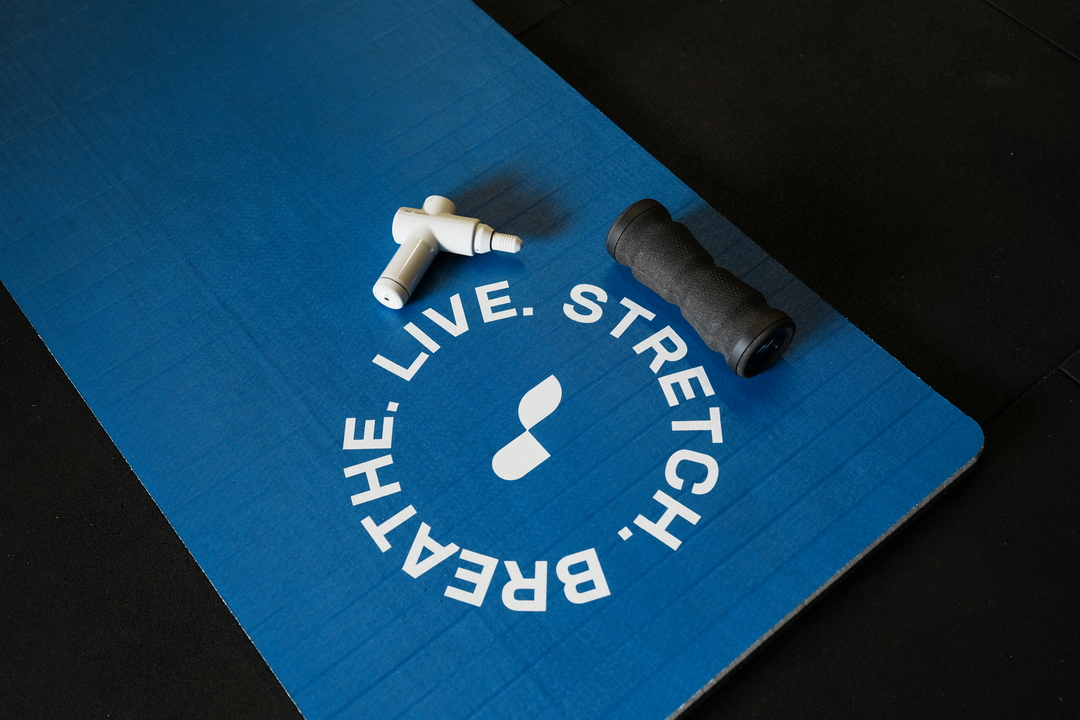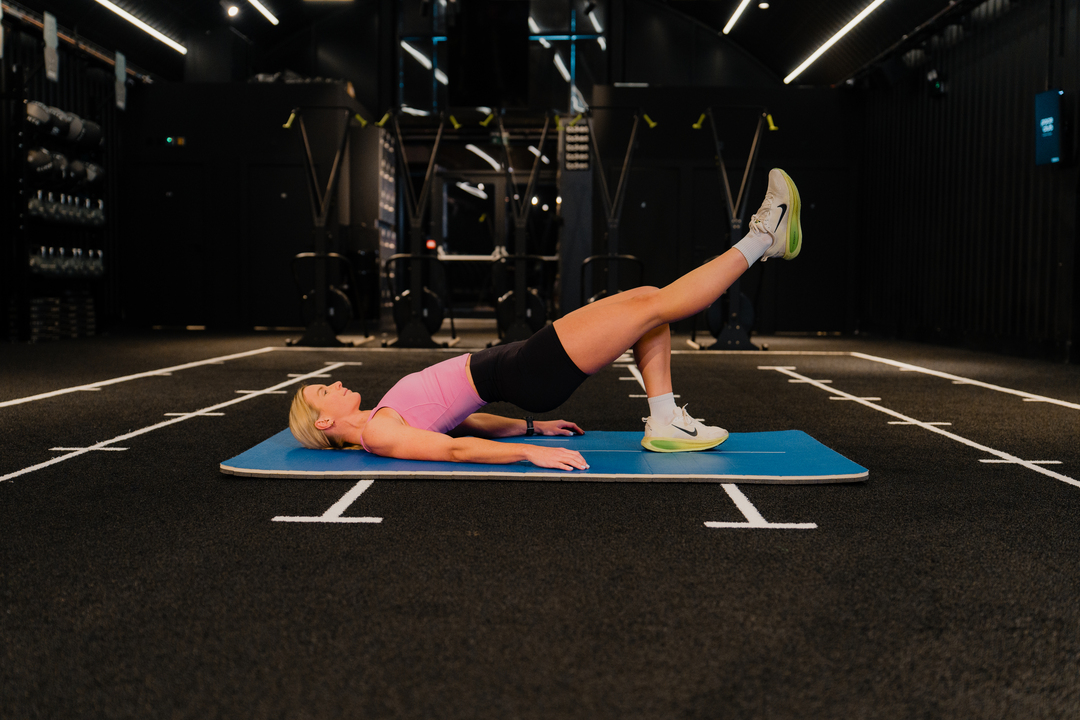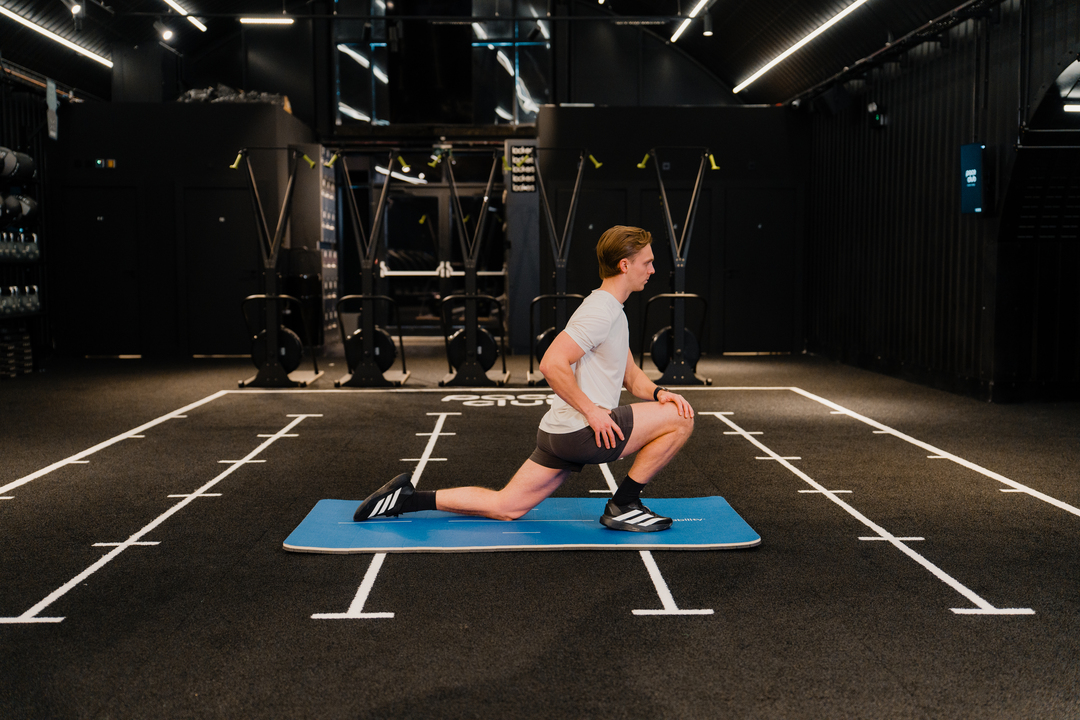After an intense workout, you might feel a sense of accomplishment. But that feeling can quickly fade as muscle soreness kicks in. You might feel stiff, achy, and downright miserable the next day. Sure, you can push through and work out again. But your body will likely resist. You may even end up sidelined with an injury, or at best, unable to train consistently and reach your fitness goals efficiently. The good news is that you don’t have to suffer through recovery alone. There are plenty of strategies to speed up muscle recovery, and one of the best recovery tools for athletes is optimizing your nutrition. In this article, we’ll explore the best vitamins for muscle recovery so you can recover faster, feel less sore, and rebuild stronger muscles to train consistently and reach your fitness goals more efficiently.
Pliability’s mobility app is a valuable tool for achieving muscle recovery goals. With hundreds of routines to boost recovery, flexibility, and mobility, the app can help you get back to your workouts faster and reach your fitness goals efficiently.
Why are Vitamins Important for Muscle Recovery?

Vitamins support muscle recovery after exercise by:
- Aiding muscle repair
- Reducing inflammation
- Supporting immune function
According to the American Academy of Family Physicians, meeting the daily requirement for vitamins and minerals is essential for overall health. Add in exercise most days of the week, and getting enough vitamins for muscle growth and repair becomes even more critical. "Vitamins are involved in various metabolic functions at the cellular level to form new and repair existing muscle, and exercise demands both of these functions," says Monica Auslander Moreno, MS, RD, LD/N, nutrition consultant for RSP Nutrition.
Many vitamins fight inflammation, support stress levels, and promote immune health. They can also help support hypertrophy, otherwise known as muscle size increase. All of this is crucial in your journey toward muscle growth and repair.
Vitamins Help Convert Food into Energy for Muscle Recovery
Recovering from exercise requires energy, and vitamins help your body efficiently convert food into usable energy, so you have enough fuel for this process. "Vitamins are crucial in metabolizing macronutrients (carbohydrates, proteins, and fats) into energy. They act as coenzymes, which means they assist enzymes in various metabolic reactions that convert food into usable energy for the body," says Auslander Moreno.
Vitamins Are Antioxidants That Combat Exercise-Induced Oxidative
Stressful exercise can produce free radicals, reactive molecules that can cause oxidative stress and damage cells. Vitamins C and E are antioxidants that help neutralize these free radicals, reducing muscle damage and promoting recovery.
Vitamins Support Immune Function After Intense Workouts
Intense exercise can temporarily suppress the immune system, making you more susceptible to illness and infection. Several vitamins, including vitamins A, C, and D, are known to support immune function. Maintaining a healthy immune system allows your body to recover more efficiently from exercise-induced muscle damage.
Vitamins Help Enzymes Function Properly During Muscle Recovery
Enzymes are proteins that facilitate biochemical reactions in the body. Many vitamins are essential for adequately working enzymes, enabling them to carry out specific reactions necessary for various physiological processes. Without adequate vitamin levels, enzyme activity may be compromised.
Vitamins Support Cellular Function for Muscle Recovery
Vitamins are involved in maintaining the normal functioning of cells- if vitamin quantities are adequate at the cellular level, it leads to optimum muscle functioning. Vitamins support cellular processes such as DNA synthesis, cell growth, and cell signaling, and also contribute to the production of neurotransmitters, hormones, and other essential molecules involved in cell communication.
Related Reading
- What Is Active Recovery
- Why Is Recovery Important for Athletes
- Is Yoga Active Recovery
- Should You Be Sore After Every Workout
- Calves Sore After Running
- Which Muscles Recover the Fastest
- Why Are Ice Baths Good for Muscle Recovery
- What to Do on Recovery Days
- Why Is It Important to Include Recovery Time in a Workout Program?
- What to Drink for Muscle Recovery
12 Best Vitamins for Muscle Recovery

Muscle recovery is vital for athletes who want to build strength, improve performance, and avoid injury. Nutrition plays a significant role in muscle recovery; vitamins are key micronutrients that help the body recover after exercise.
Different vitamins perform specific functions that support muscle recovery, and getting enough of them can help you recover faster and boost your performance in your next workout or competition.
1. Vitamin D
Vitamin D is critical for muscle recovery and growth, particularly for bodybuilders and strength athletes. Unlike other vitamins, its production depends on direct sunlight exposure, making deficiency common among individuals with limited sun exposure.
Vitamin D supports muscle health through multiple pathways:
- Testosterone Production: It plays a key role in regulating testosterone, a hormone essential for muscle development. Studies have shown that vitamin D supplementation can increase free testosterone levels by up to 20% in men with deficiencies.
- Explosive Strength: When combined with resistance training, vitamin D has been associated with enhanced explosive power compared to placebo groups.
- Protein Synthesis: Its influence on hormonal balance also improves protein synthesis, an essential muscle repair and growth process.
- Bone Health: Vitamin D supports skeletal strength by working synergistically with calcium and magnesium, helping to maintain bone density and prevent injury.
Due to its broad impact on physical performance, hormone regulation, and skeletal integrity, vitamin D is one of the most essential vitamins for athletes focused on recovery and muscle development.
2. Vitamin C
Vitamin C supports muscle performance, recovery, and overall physical health. Known primarily as a powerful antioxidant, it protects muscle cells from oxidative stress caused by free radicals during intense training.
Key benefits of Vitamin C for muscle health include:
- Hormonal Support: It produces testosterone and other anabolic hormones contributing to muscle growth.
- Iron Absorption: Vitamin C enhances the body’s ability to absorb iron, a critical mineral for oxygen delivery to muscles and tissues.
- Reduced Muscle Soreness: A study published in the International Journal of Sports Nutrition and Exercise Metabolism found that Vitamin C supplementation before and after workouts helped reduce muscle soreness and preserved glutathione, a key antioxidant linked to improved recovery and performance.
- Tissue Repair and Skin Health: It also boosts collagen synthesis, supporting connective tissue repair and maintaining skin elasticity.
To maximize your intake, include a variety of vitamin C–rich foods such as:
- Citrus fruits
- Strawberries
- Bell peppers
- Tomatoes
- Cruciferous vegetables like:
- Broccoli
- Brussels sprouts
3. Vitamin E
Vitamin E is a powerful antioxidant that protects the body from oxidative stress caused by intense training, inflammation, and environmental stressors. Neutralizing harmful free radicals supports faster muscle recovery, reduced cellular damage, and enhanced immune resilience.
Core benefits of Vitamin E include:
- Muscle Recovery: Combating oxidative stress helps reduce muscle damage and inflammation after intense workouts.
- Immune & Cardiovascular Health: Supports immune defense and promotes cardiovascular function.
- Eye Health: Contributes to long-term vision protection through its antioxidant activity.
Important Note: While Vitamin E is beneficial, some studies indicate that high-dose supplementation may interfere with strength gains. To reap its benefits safely, focus on vitamin E–rich whole foods like almonds, sunflower seeds, and hazelnuts rather than supplements.
4. Beta-Carotene
Beta-carotene is a plant-based form of vitamin A. It's a preferred form for taking vitamin A in supplement or food form because it doesn't contain the risk of toxicity that vitamin A supplementation poses in large, frequent doses.
Colorful fruits and vegetables are excellent sources of beta-carotene and pose no risk for overdosing. Beta-carotene is also an antioxidant, providing specific recovery benefits for those on hard-training weight programs that produce harmful free radicals.
5. Vitamin B3
Another powerful B vitamin component, vitamin B3 (also known as niacin), is popular among bodybuilders for increasing muscular vascularity or the appearance of superficial veins. The benefits don’t stop at the gun show.
One study found that niacin increased NAD+, an antioxidant that may improve muscle performance in mitochondrial myopathy patients. Other benefits include:
- Muscle repair
- Recovery
- Enhanced metabolism
Vitamin B3 can be obtained by consuming animal foods like:
- Meat
- Fish
- Eggs
- By eating plant foods like:
- Seeds
- Bananas
6. Vitamin A
The mighty antioxidant, vitamin A, doesn’t directly strengthen your muscles, but it keeps you performing optimally. It supports your vision, is essential for bone growth and development, and fights inflammation.
To harness the benefits of vitamin A, incorporate more animal foods like:
- Liver
- Salmon
- Egg yolks
- Plant foods such as:
- Sweet potatoes
- Squash
- Carrots
Vitamin A is fat-soluble, so it should be consumed as part of a balanced meal with healthy fats to maximize absorption.
7. Vitamin K2
This vitamin, known as menaquinone, is a lesser-known form of vitamin K. It belongs to the family of fat-soluble vitamins and plays a vital role in various physiological processes. The primary function of vitamin K2 is to activate proteins involved in blood clotting and bone metabolism. It is essential to produce clotting factors that help blood coagulate when injuries occur.
Clinical trials in sarcopenia suggest vitamin K supplementation could improve muscle mass and function. Muscle cell studies suggest vitamin K2 encourages muscle cell proliferation, which helps build muscle. Observational trials suggest high vitamin K levels are associated with increased bone mineral density and reduced fracture risk.
8. Vitamin B6
Vitamin B6 plays an essential role in the metabolism of protein. Studies have demonstrated that the more protein you eat, the more vitamin B6 your body needs to break down and use that protein. Vitamin B6 can also promote red blood cell production and healthy levels of nitric oxide, which is produced naturally in the body and can support physical performance and endurance.
B6-friendly foods include fish, beef liver and other organ meats, potatoes, fruit, and fortified cereals in your daily diet. Found naturally in foods like fatty fish, bananas, and chickpeas, vitamin B6 is also well represented in vitamins and supplements so that you may find a hefty dose in your multivitamin.
9. Vitamin B9
Vitamin B9, otherwise known as folate or folic acid (the synthetic version of folate), is essential in human development from the womb to the tomb. It's vital as a prenatal vitamin for pregnant women and remains vital throughout our lives for:
- Energy production
- Muscle tissue repair
- New muscle cell creation
Vitamin B9 is found in foods like spinach and avocado, a healthy fat. It's widely prevalent in multivitamin formulas and protein powders for:
- Workout recovery
- Muscle repair, and more
10. Vitamin B2 or Riboflavin
Vitamin B2 metabolizes fat and protein and helps convert carbs to ATP, which your cells use for energy. One study found that during running, vitamin B2 supplementation might reduce muscle pain and soreness during and after prolonged exercise, and enhance early recovery post-workout.
For more B2, look to:
- Meat
- Milk
- Mushrooms
- Spinach
- Almonds
11. Vitamin B12
The last of the impressive family of B vitamins on this list, vitamin B12, works closely with folate for muscle repair. It is essential for producing the red blood cells needed to deliver oxygen to our muscles. Vitamin B12 is found in animal foods like meat, dairy, poultry, and fish, and vegans and vegetarians may suffer from a B12 deficiency due to their reliance on plant-based foods.
For those who don't eat meat, soy products, nut milks, and fortified cereals have some vitamin B12, and supplementation with B12 is often recommended to shore up any gaps.
12. Biotin
While great for hair, skin, and nails, biotin (vitamin B7) also transforms your macronutrients into energy for workouts. Biotin primarily converts food into energy, aiding fitness levels and enhancing muscle protein synthesis.
You can find biotin in foods like:
- Meat
- Egg
- Nuts
- Sweet potatoes
- Dairy products
- As a supplement
Related Reading
- Natural Muscle Recovery
- Is Sauna Good for Muscle Recovery
- Is Swimming Good for Recovery
- Benefits of Active Recovery
- How to Speed Up Muscle Recovery
- Active Recovery vs Rest Day
- Active vs Passive Recovery
- Recovery Methods for Athletes
- How to Speed Up Muscle Strain Recovery
- Muscle Recovery Time by Age
Improve Your Flexibility with Our Mobility App Today | Get 7 Days for Free on Any Platform

Pliability offers a fresh perspective on yoga, tailored for performance-oriented individuals and athletes. Our app features a vast library of high-quality videos designed to:
- Improve flexibility
- Aid recovery
- Reduce pain
- Enhance range of motion
Pliability provides daily-updated custom mobility programs for those interested in optimizing their health and fitness. It also includes a unique body-scanning feature to pinpoint mobility issues. If you're feeling limited by pain or ability to move, Pliability aims to complement your fitness routine and help you move better.
Sign up today for 7 days absolutely for free, on iPhone, iPad, Android, or on our website to improve flexibility, aid recovery, reduce pain, and enhance range of motion with our mobility app.
Related Reading
- Which Magnesium Is Best for Muscle Recovery
- Hot or Cold Bath for Muscle Recovery
- Benefits of Massage Gun
- Foam Roller Benefits
- Chocolate Milk for Muscle Recovery
- How to Speed Up Muscle Strain Recovery in Back
- Causes of Poor Muscle Recovery
- Active Recovery Workout
- Active Recovery Stretches
- Best Recovery Tools for Runners
- Best Foods for Muscle Recovery








